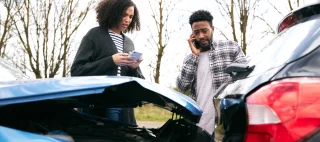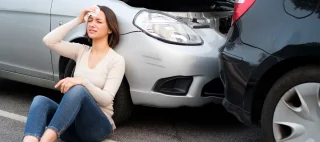Liability Auto Insurance
Find Low-Cost Coverage Options Today
What is Liability Coverage?
Liability insurance is a type of car insurance that helps protect you if you’re responsible for injuring someone or damaging their property. Liability consists of bodily injury or death liability and property damage liability.
It covers things like legal fees, medical bills, and repairs for the other people involved in an accident that you cause. Basically, it keeps you from having to pay out-of-pocket for costs incurred by others when you have been determined to be the at-fault driver.
This is true in at-fault states, which are the majority. However, in no-fault states, such as Florida, your liability insurance will help pay for your own damages, no matter who is at fault. In some instances, drivers may share blame for an accident, in which case, the courts will determine a percentage each one is responsible for when paying for damages.
Liability Insurance is Mandatory to Drive
Most states in the U.S. require liability insurance to drive legally. However, New Hampshire and Virginia are exceptions. In New Hampshire, you can skip insurance, but you’ll need to prove you can cover any damages yourself if you get into an accident. In Virginia, you can pay a fee to the state instead of having insurance, but this leaves you on the hook for any damages.
Your friendly neighborhood Acceptance Insurance agents have plenty of experience finding affordable liability coverage to help you protect the things that are most important. We do the research for you, so you can pick the best option for your unique situation.

What Does Liability Auto Insurance Cover?
Liability insurance protects you against the financial costs of damage and injuries you cause to others in an accident where you are at fault. It covers medical expenses, property damage, and other related costs up to your policy’s limits, ensuring you are not personally responsible for paying these expenses out of pocket.
The numbers listed on your car insurance policy, such as 25/50/25 or $25,000/$50,000/$25,000, represent the liability coverage limits your policy carries. For example, a policy with these limits will cover:
- $25,000 for bodily injury (per person)
- $50,000 for bodily injury (per accident)
- $25,000 for property damage (per accident)
If you are at fault in an accident, these limits are the maximum your insurance will pay for the other person’s injuries and property damage. The total for all injuries is capped at $50,000, while each person’s injuries are capped at $25,000. Property damage is covered up to $25,000. In a no-fault state, these limits apply to your own injuries and damage.
This is one reason many drivers choose to increase the limits of their policy. With today’s expenses for medical care and car repairs, these minimums may not be enough, leaving you to pay for the rest out of pocket.
Note: New Hampshire does not require car insurance, and Florida does not require bodily injury liability coverage.
Types of Auto Insurance Coverage
How Much Does Liability Car Insurance Coverage Cost?
Liability insurance costs can differ widely depending on various factors, including your location, driving history, vehicle type, and the level of coverage you choose. On average, you can expect to pay anywhere from $300 to $1,000 annually.
Living in high-risk areas, such as regions with heavy traffic or high accident rates, can lead to higher premiums. Additionally, a poor driving record, including past accidents or traffic violations, may increase your costs. The type of vehicle you drive also plays a significant role—luxury cars or high-performance vehicles typically come with higher insurance premiums.
Choosing the right level of coverage is also key to determining your premium. While more extensive coverage can provide greater protection, it often comes with a higher price tag. On the other hand, opting for the minimum required coverage may help keep your costs lower, but could leave you financially vulnerable in case of an accident.
Ready to Get a Quick Quote?
Liability Coverage in At-Fault States vs. No-Fault States
Each state has its own way of handling car insurance claims, with systems falling into either at-fault or no-fault categories—and this can make a big difference in how your liability coverage works. In at-fault states, like Texas or California, the driver who causes the accident is responsible for covering damages to the other party.
. So, if you rear-end someone, your insurance will cover their repairs and medical costs, but you’ll be on your own for your own car’s repairs unless you have extra coverage.
On the other hand, no-fault states, like Pennsylvania, require everyone to have personal injury protection (PIP), which covers your own medical bills and damages, no matter who caused the accident. Knowing which system your state uses helps you understand what coverage you need to stay fully protected on the road.
What Doesn’t Liability Auto Coverage Cover?
When you’re looking at car insurance, it’s important to know exactly what your policy covers—and just as crucial, what it doesn’t. While your liability car insurance helps protect you from the financial burden of accidents where you’re at fault, there are certain situations it won’t cover. Here’s a breakdown of what’s not included in most basic policies, so you can make sure you’re fully protected:
- Your own injuries: If you’re hurt in an accident you caused, your insurance won’t cover your medical bills. You’d need a separate policy, like Personal Injury Protection (PIP) or medical payments coverage, for that.
- Damage to your own vehicle: If you’re at fault in an accident, your insurance won’t pay for your car’s repairs. You’ll need collision coverage to get that kind of protection.
- Damage caused by an uninsured driver: If someone without insurance hits you, your regular policy won’t pay for the repairs or medical costs. To cover this, you’ll need uninsured motorist coverage, which some states require by law.
- Non-collision incidents: If your car is damaged by something other than a collision—like theft, vandalism, or a natural disaster—your basic policy won’t cover it. For that kind of protection, you’d need comprehensive coverage.
- Medical expenses for your passengers: While your policy may cover the other driver’s medical expenses if you’re at fault, it won’t extend to your own passengers unless you have specific coverage in place.
- Intentional damage: If the accident was caused intentionally, or by illegal actions (like driving under the influence), your insurance won’t cover the damage.

How Much Liability Coverage Should I Get?
The amount of liability coverage you need depends on factors like state requirements, your assets, and risk tolerance. Here are key points to consider:
- State Minimum Requirements: States set minimum coverage levels, but they may not be enough in serious accidents. It’s recommended to go beyond the minimum if possible.
- Your Assets: If you have significant assets, higher coverage protects them. If your limits are too low, you could be financially liable for the excess.
- Risk Tolerance: Higher coverage offers better protection, especially if you drive in busy areas. Experts suggest at least $100,000 per person and $300,000 per accident for peace of mind.
- Medical and Property Costs: Serious accidents can lead to high medical and repair bills. Higher coverage helps cover those costs.
- Peace of Mind: While higher coverage costs more, it offers peace of mind knowing you’re fully covered in case of a serious accident.
Ultimately, it’s wise to opt for higher limits to protect your assets and ensure financial security. At Acceptance Insurance, our independent agents will be happy to help you find affordable coverage that protects you and your assets.
Get Affordable Liability Insurance Quotes Today
Protect yourself with the right liability insurance. Acceptance Insurance offers fast, affordable quotes online so you can get covered today. If you’d like more personalized help, our friendly agents are available by phone at 877-405-7102 or in person at one of our convenient locations. We’re here to help you get the best coverage without stress.
Frequently Asked Questions About Liability Car Insurance
What’s the Difference Between Full Coverage and Liability Insurance?
Liability insurance only covers damages and injuries you cause to others in an accident, including their medical expenses and property repairs. Full coverage, on the other hand, includes liability insurance as well as collision and comprehensive coverage. This means full coverage also protects your vehicle from damage caused by accidents, theft, vandalism, or natural disasters.
How Much Does Full Coverage vs. Liability Coverage Cost?
On average, liability insurance costs between $300 and $1,000 annually, while full coverage ranges from $1,000 to $2,500 depending on factors like your location, vehicle, and driving history. While liability is cheaper, full coverage provides broader protection for your car and finances.
Does Liability Car Insurance Cover Rental Cars?
Liability car coverage can cover damages or injuries you cause to others while driving a rental car, but it won’t cover damage to the rental vehicle itself. To protect the rental car, you may need collision damage waivers from the rental company or your own comprehensive and collision insurance.
Does Liability Auto Insurance Cover Passengers in My Vehicle?
Liability insurance typically does not cover medical expenses for passengers in your vehicle. For that, you would need additional coverage such as Medical Payments Coverage (MedPay) or Personal Injury Protection (PIP), depending on your state’s requirements.
Does Liability Insurance Cover My Car If I Hit Someone?
No, liability insurance does not cover damage to your own car if you are at fault in an accident. It only pays for damages and injuries you cause to others. To cover your own vehicle, you would need collision coverage in addition to liability insurance.

